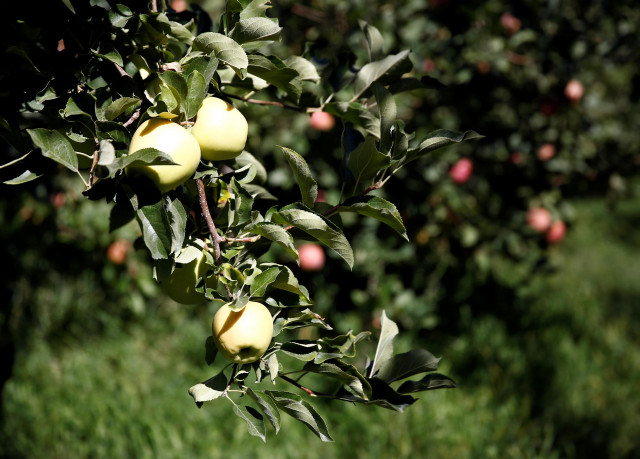Orchard in Thar bears fruits via biosaline agriculture
This is the first time an apple ber orchard grown in a desert has bore fruit

A Reuters file photo of an apple orchard.
The Thar Foundation, SECMC's welfare arm, which oversaw the project, cultivated green-coloured apple bers over an area of 10 acres in Thar Coal Block II in Islamkot taluka. As many as 120 trees were planted per acre. The experimental cultivation was part of a biosaline agriculture project, which utilises underground water pumped out from a depth of approximately 200 metres via an aquifer.
The ber trees were provided water of up to 3,500 ppm under technical support provided by the Pakistan Agriculture Research Council (PARC). "Within one year, these plants have started yielding fruits and every tree has yielded five to seven kilogrammes of apples on average," said Umair Aslam Butt, in-charge of Thar Green Initiative and manager of the SECMC health, safety and environment department.
He expects an earning of between Rs35,000 and Rs40,000 per acre of the orchard after the first harvest, with the current market price of apple ber being around Rs2,200 per 40kg. Butt said that underground saline water, bearing 5,500 total dissolved solids (TDS), was mixed with wastewater in a dilution water reservoir, and the resultant solution, with 3,500 TDS, was used to irrigate the orchard. He added that the techniques of drip and sprinkler irrigation were employed instead of the traditional flood irrigation method in order to save water.
Syed Murtaza Azhar Rizvi, the SECMC site operations director, said the results had encouraged them to expand biosaline interventions in Tharparkar, which is blessed with large amount of subsoil water. "In view of the water scarcity in the region, conventional farming dependency on rainwater can be replaced by available saline water to provide livelihood to the local farmers," he said.
Thar Foundation joined hands with PARC for a pilot project in 2018, and since then they have successfully tested grafted species of bair (jujube), lemon and cheeku (sapota) over an area of 20 acres, through drip irrigation via biosaline water. On December 3, 2019, they signed a memorandum of understanding to collaborate on a project pertaining to salt-resistant fodder and cash crop species.
Training the local farmers, information exchange, awareness campaigns, and developing an economic value chain for the previously tested species is also a part of their project. The company has already established biosaline fish farms.



















COMMENTS
Comments are moderated and generally will be posted if they are on-topic and not abusive.
For more information, please see our Comments FAQ